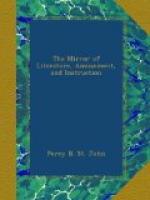The day arrived, and etiquette demanded that the proper officer should examine and report upon the nature of the expected entertainment, a duty that had been deferred until a late hour of the day. Well was it that the confiding prince had not wholly dispensed with that form; for verily the said officer found the colonel, with a dirty scullion for his aide du camp, in active and zealous preparation for his royal visiter; his shirt sleeves tucked up, while he ardently basted the identical and solitary “leg of mutton” as it revolved upon the spit: potatoes were to be seen delicately insinuated into the pan beneath to catch the rich exudation of the joint; while several tankards of foaming ale, and what the French term “bread a discretion,” announced that, in quantity, if not in quality, he had not been careless in providing for the entertainment of his illustrious guest. Although the colonel’s culinary skill leaves no doubt that the leg of mutton would have sustained (according to Mr. Hunt’s elegant phraseology) critical discussion on its intrinsic merits, or on its concoction; and although the dinner might have been endured by royalty (of whose homely appetite the ample gridiron at Alderman Combe’s brewery then gave ample proof), yet his royal highness’s poodles would assuredly have perspired through every pore at the very mention of what a certain nobleman used to term a “jig-hot;” so the feast was dispensed with, and due acknowledgment made for the evident proofs of hospitality which had been displayed.
After various vicissitudes of life and fortune, in Hanger’s advanced age, a coronet became his, and it came opportunely; for he had at length learned experience, and knowing the value of the competence he had obtained, he resolved to enjoy it. He had had enough of fashion; and had proved all its allurements. So he took a small house in a part of earth’s remoter regions, no great way from Somers’ Town, near which stood a public-house he was fond of visiting, and there, as the price of his sanction, and in acknowledgment of his rank, a large chair by the fire-side was exclusively appropriated to the peer.—New Monthly Magazine.
* * * * *
ANECDOTES OF UGO FOSCOLO, THE ITALIAN POET.
Foscolo was in person about the middle height, and somewhat thin, remarkably clean and neat in his dress,—although on ordinary occasions, he wore a short jacket, trousers of coarse cloth, a straw hat, and thick heavy shoes; the least speck of dirt on his own person, or on that of any of his attendants, seemed to give him real agony. His countenance was of a very expressive character, his eyes very penetrating, although they occasionally betrayed a restlessness and suspicion, which his words denied; his mouth was large and ugly, his nose drooping, in the way that physiognomists dislike, but his forehead was splendid in the extreme; large, smooth, and exemplifying all the power of thought




